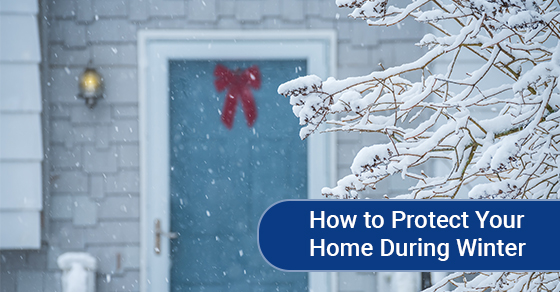
How to Protect Your Home During Winter
Canadians know that when winter arrives, they need to bundle up and protect themselves against the cold, yet many don’t realize their homes need protection from the cold as well. We often take our homes for granted assuming that as long as the heat is working all is well.
However, as soon as the fall arrives, we should be taking precautions to protect our homes from the many hazards cold weather, snow and ice present. If you own a house, here are some tips to prepare your home from the unpredictable winter weather.
Prevent Ice Dams
Have a roof inspection in the fall to look for roof damage that should be repaired before it gets cold. You also want to keep an eye on your roof as the weather gets cold and snow begins to fall, as ice dams can form.
Ice dams are created when snow and ice buildup on your roof. If your eaves and gutters are jammed, the buildup forces ice upwards which can stop water from rolling off your roof as it should.
When this happens, the water has nowhere to go, so it is forced under your tiles and trickles into your home. The more snow and ice that builds up, the worse leaks become, and the more damage is caused as the water reaches your interior walls.
Not all such damages are covered by your home insurance. The longer this goes on, the more serious damage becomes including not only cosmetic issues to your walls but also structural issues that affect the integrity of your roof.
If you spot icicles — especially large ones — along your roof chances are you have ice dams. By having a roof inspection your roofer can ensure your gutters are clear of debris, while also looking for signs you might need to replace or add a water-repellent membrane to your roof to protect against winter leaks.
Protect Against Pipe Freezing
What lies beneath your walls can often cause issues in the winter, including exposed pipes. In some homes where pipes are located on outer walls, if the pipes are not properly protected, they can freeze when temperatures drop.
This is very common in garages where pipes for outdoor taps might be located as garages are not heated. During the winter, freezing can cause pipes to burst because the ice expands the water as it freezes. It is important to ensure the pipes in your home are heated and properly insulated so they are not exposed to the cold.
To be safe, you can run water through all fixtures regularly when there are cold-weather warnings. If you can see exposed pipes such as those in the garage, wrap them in insulation sleeves. You can turn off the water supply for outdoor pipes and make sure they are well-drained.
If you do experience a burst pipe, turn off the water supply immediately and call a plumber. You want to avoid water damage that might not be covered on your home insurance.
Improve Insulation
Every home has vulnerable areas that can let in the cold. You can do simple maintenance in the fall to help keep your home more winter efficient.
There are many DIY insulation products you can use including silicone foam for larger gaps and holes you spot in the walls, around window frames and door frames. Caulking can be used for smaller gaps.
A good test is to hold up a lighter to your door and window frames and if it moves, you have cold air coming in. By sealing these areas your home will stay warm and you can also reduce heating bills. You can also add weather stripping to doors and windows that don’t have a tight seal.
Heating Maintenance
Have a heating expert come in to perform winter maintenance to ensure there isn’t a risk for the system to fail. If your heater does fail in cold temperatures, you increase the risk of pipes freezing.
Depending on where you live, you might consider a generator to keep everything working in the case of a storm-related power outages.
Clear Branches and Pathways
If you have trees or even large bushes on your property make sure they are trimmed in the fall. This will help with avoiding downed branches that can damage your home and vehicle due to heavy snow, wind or ice.
Clear Ice and Snow from Pathways
It is a homeowner’s responsibility to remove snow and ice from walkways on your property following a blizzard. Be sure to also apply rock salt, sand or snow melting products to avoid slips.
If someone is injured on your property due to uncleared paths, you can actually be liable to pay for their recovery, lost wages and more.
Check Your Wood Burning Stove or Fireplace
Your wood-burning stove and fireplace offer additional warmth in the winter, however, you need to ensure they are safe with annual checkups and cleanings. Have an expert inspect and clean it for you. They can check for chimney damage that can lead to issues and cap your chimney to keep out unwanted visitors.
A cap also protects from rain, snow, and debris from falling into the chimney. Check your damper to keep it clear of debris as this can interfere with your flue from opening which can allow smoke to get into your home.
One of the most important reasons your chimney must be cleaned is because creosote is formed in your chimney when wood is burned. This mass can catch on fire as once it is ignited its temperature rises quickly posing risk for a house fire.
Protect Your Home when Away
Winter is the time of year many people travel to warmer climates. Whether you are gone overnight or for the entire winter, you can take precautions to reduce the risk of burglary.
Make sure you stop newspaper deliveries and mail or have someone pick it up daily as a build-up of mail is a dead giveaway to criminals you are away. Having someone shovel your snow is good practice as well.
Install motion detectors to scare potential intruders away. You can also have your lights set to go on and off to make it appear someone is home using smart home technology. A security system with monitoring is always your best bet, and will also reduce your home insurance rates.
If this is not possible ensure you have secure deadbolt locks on doors and slide locks on all your sliding doors and sliding windows. To avoid issues with burst pipes you can do one or all the following:
- Check with a plumber to see if it is safe to turn off your main water supply
- Keep your heat set at 13 °C to avoid freezing
- Turn off the water taps connected to your laundry room, dishwasher and fridge
These tips will protect your home from winter damage and keep you safe and warm.
If you would like information about how to protect your home during winter, call Oegema Nicholson at 613-224-1455 or contact us here.

